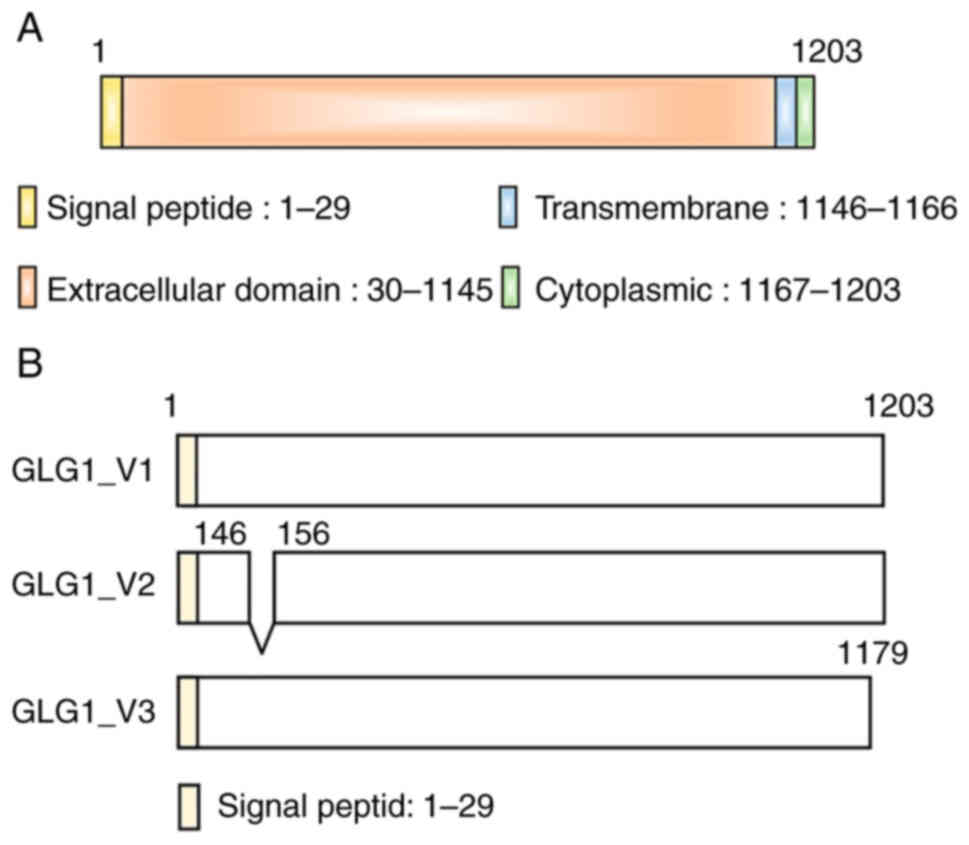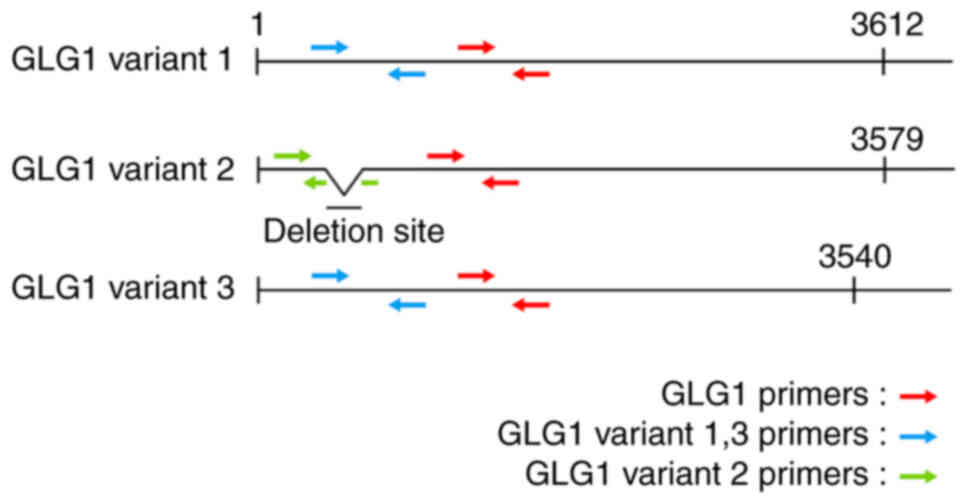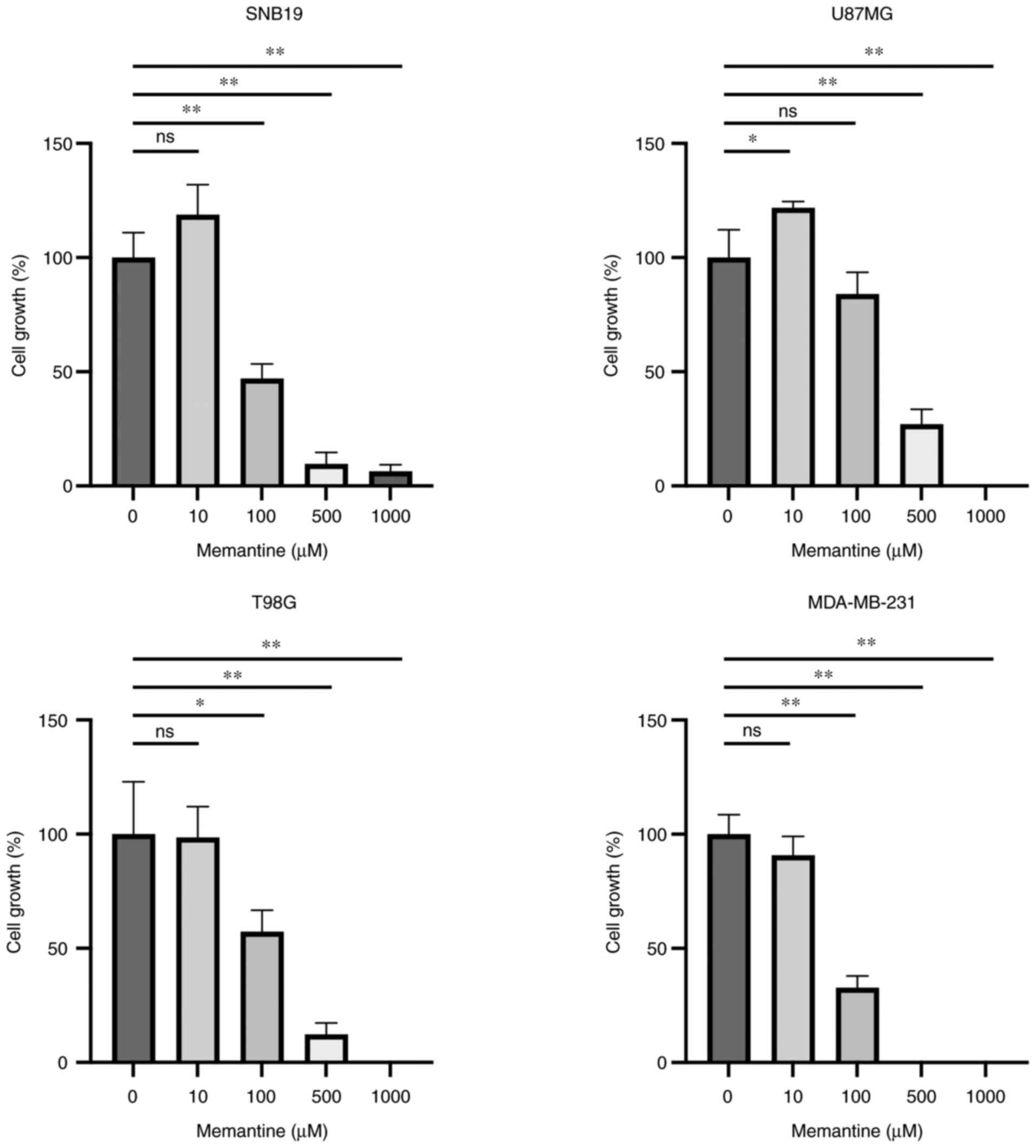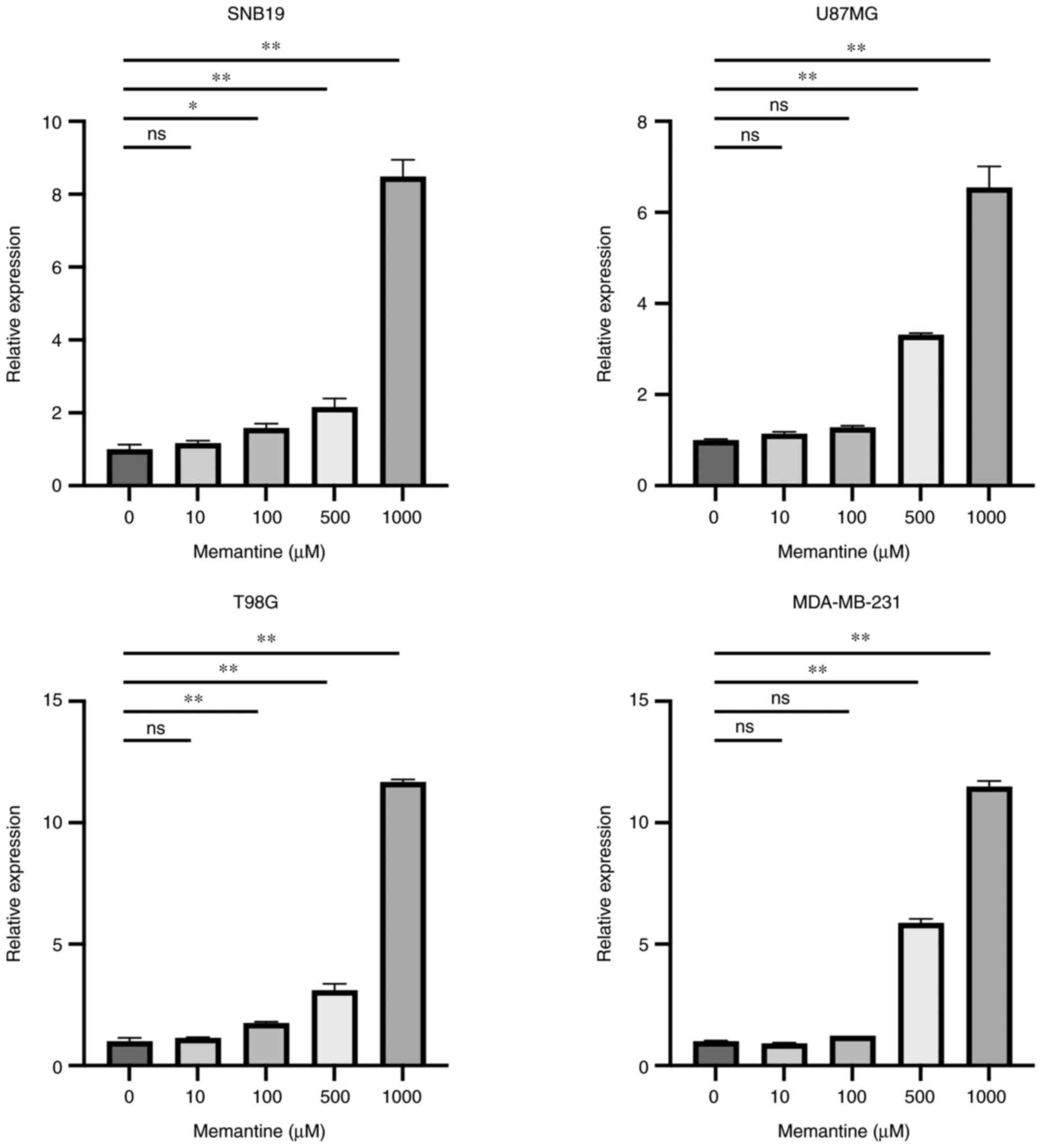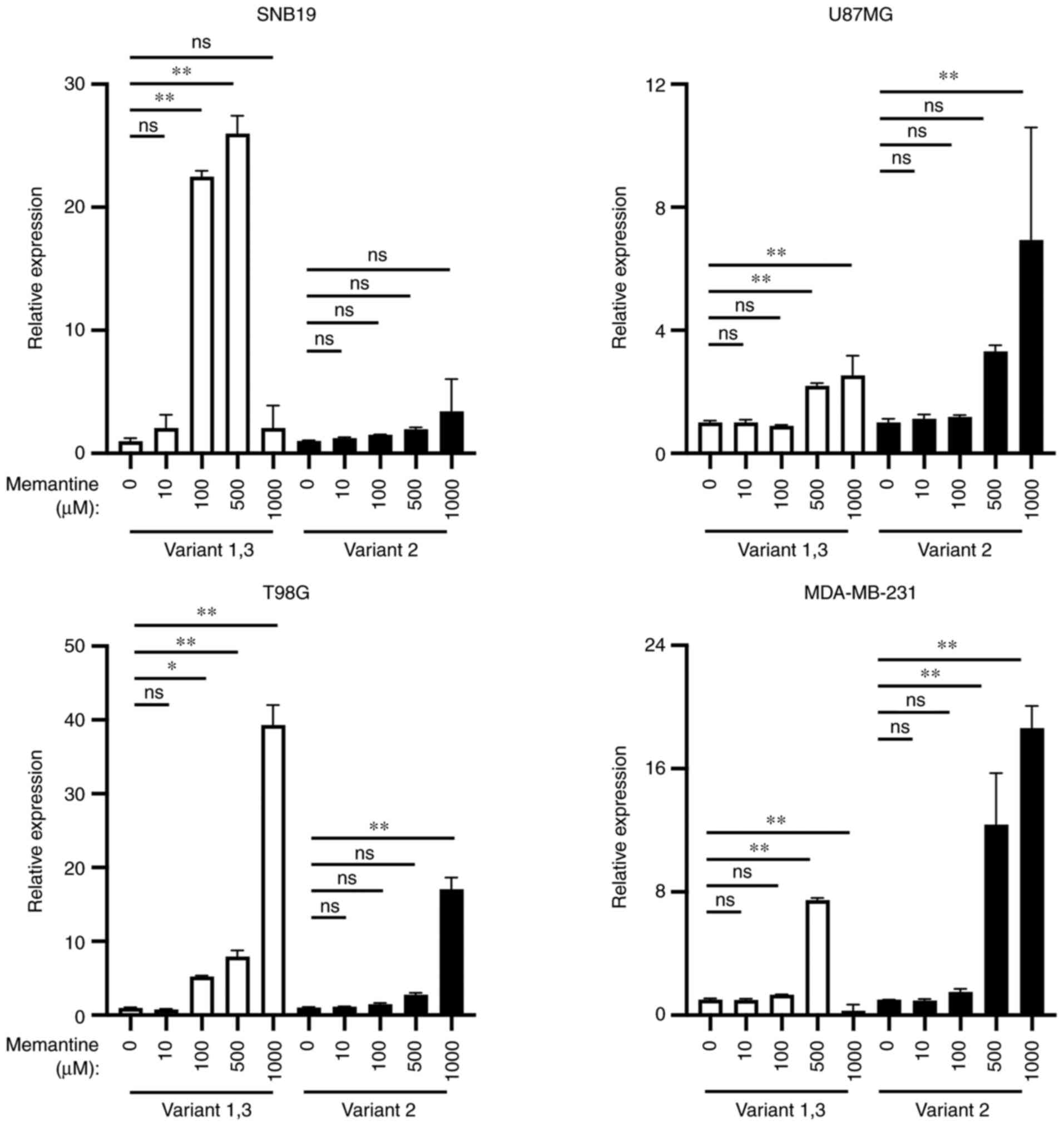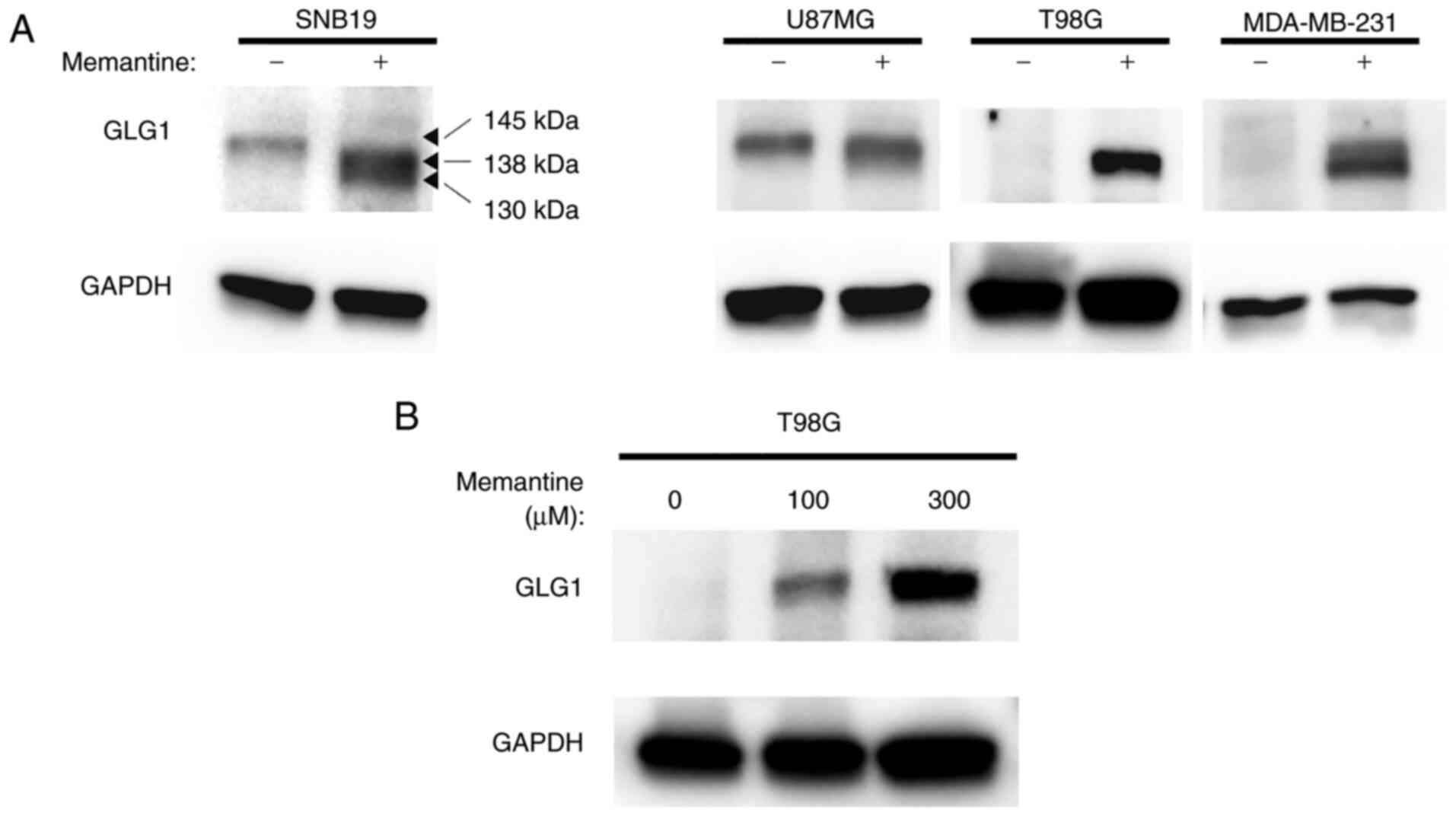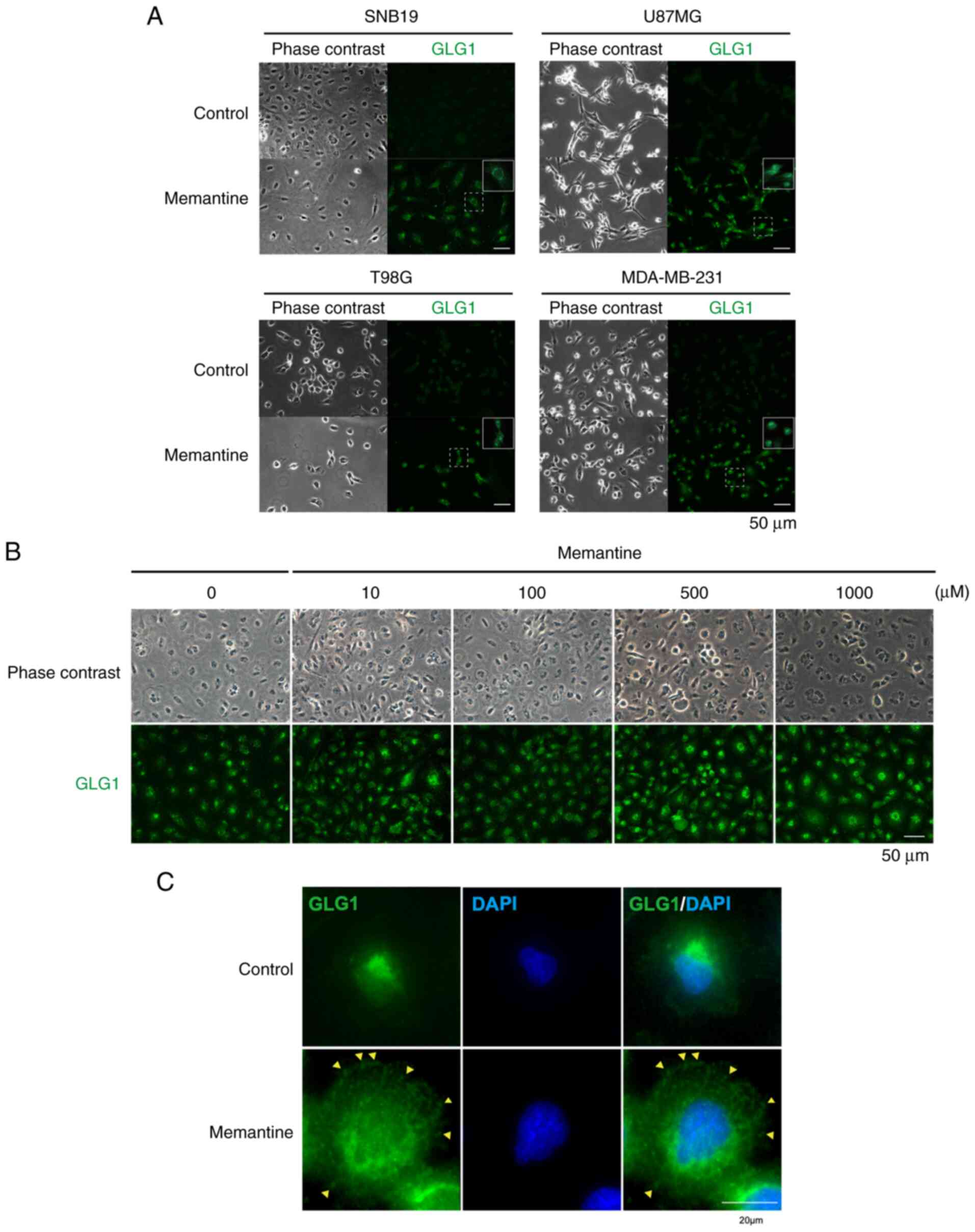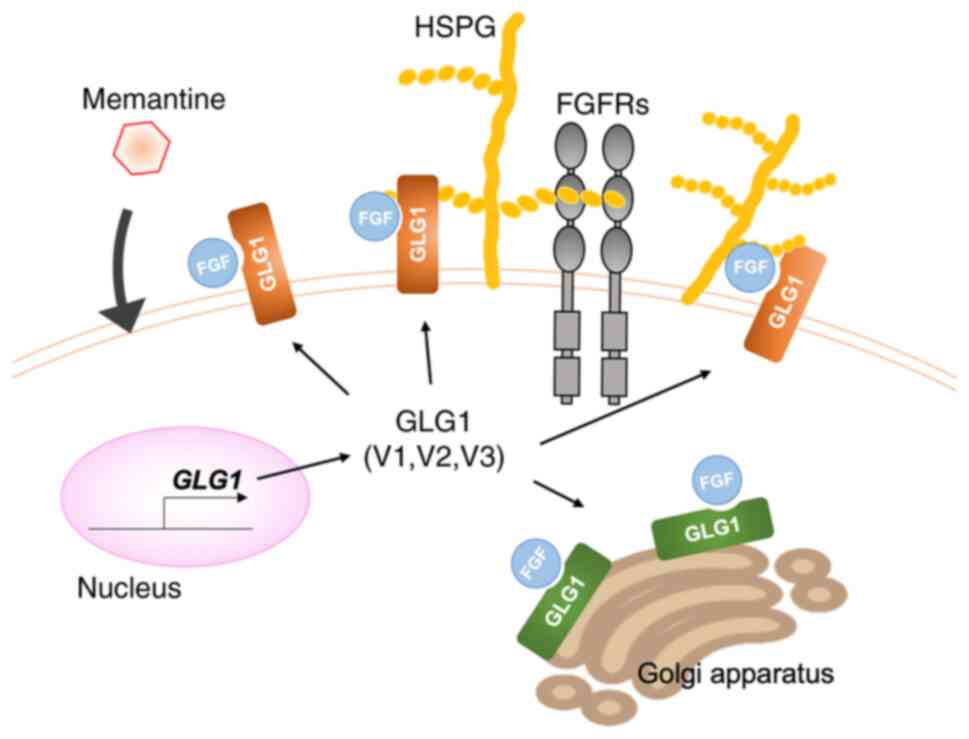|
1
|
Abbruzzese C, Matteoni S, Signore M,
Cardone L, Nath K, Glickson JD and Paggi MG: Drug repurposing for
the treatment of glioblastoma multiforme. J Exp Clin Cancer Res.
36:1692017. View Article : Google Scholar : PubMed/NCBI
|
|
2
|
Albayrak G, Konac E, Dikmen AU and Bilen
CY: Memantine induces apoptosis and inhibits cell cycle progression
in LNCaP prostate cancer cells. Hum Exp Toxicol. 37:953–958. 2018.
View Article : Google Scholar
|
|
3
|
Albayrak G and Korkmaz FD: Alzheimer's
drug memantine inhibits metastasis and p-Erk protein expression on
4T1 breast cancer cells. Bratisl Lek Listy. 121:499–503.
2020.PubMed/NCBI
|
|
4
|
Lipton SA: Paradigm shift in
neuroprotection by NMDA receptor blockade: Memantine and beyond.
Nat Rev Drug Discov. 5:160–170. 2006. View
Article : Google Scholar : PubMed/NCBI
|
|
5
|
Müller-Längle A, Lutz H, Hehlgans S, Rödel
F, Rau K and Laube B: NMDA receptor-mediated signaling pathways
enhance radiation resistance, survival and migration in
glioblastoma cells-a potential target for adjuvant radiotherapy.
Cancers (Basel). 11:5032019. View Article : Google Scholar
|
|
6
|
Yoshioka A, Ikegaki N, Williams M and
Pleasure D: Expression of N-methyl-D-aspartate (NMDA) and non-NMDA
glutamate receptor genes in neuroblastoma, medulloblastoma, and
other cell lines. J Neurosci Res. 46:164–178. 1996. View Article : Google Scholar : PubMed/NCBI
|
|
7
|
Choi SW, Park SY, Hong SP, Pai H, Choi JY
and Kim SG: The expression of NMDA receptor 1 is associated with
clinicopathological parameters and prognosis in the oral squamous
cell carcinoma. J Oral Pathol Med. 33:533–537. 2004. View Article : Google Scholar : PubMed/NCBI
|
|
8
|
Stepulak A, Luksch H, Uckermann O,
Sifringer M, Rzeski W, Polberg K, Kupisz K, Klatka J, Kielbus M,
Grabarska A, et al: Glutamate receptors in laryngeal cancer cells.
Anticancer Res. 31:565–573. 2011.PubMed/NCBI
|
|
9
|
Liu JW, Myoung SK, Nagpal J, Yamashita K,
Poeta L, Chang X, Lee J, Park HL, Jeronimo C, Westra WH, et al:
Quantitative hypermethylation of NMDAR2B in human gastric cancer.
Int J Cancer. 121:1994–2000. 2007. View Article : Google Scholar : PubMed/NCBI
|
|
10
|
Watanabe K, Kanno T, Oshima T, Miwa H,
Tashiro C and Nishizaki T: The NMDA receptor NR2A subunit regulates
proliferation of MKN45 human gastric cancer cells. Biochem Biophys
Res Commun. 367:487–490. 2008. View Article : Google Scholar : PubMed/NCBI
|
|
11
|
Abdul M and Hoosein N:
N-methyl-D-aspartate receptor in human prostate cancer. J Membr
Biol. 205:125–128. 2005. View Article : Google Scholar
|
|
12
|
Sekiguchi K, Sato M, Yokoyama MK, Sato T,
Tsutiya A, Omoteyama K, Arito M, Suematsu N, Kato T and Kurokawa M:
Effects of memantine on the growth and protein profiles of
neuroblastoma cells. Integr Mol Med. 5:1–8. 2018. View Article : Google Scholar
|
|
13
|
North WG, Liu F, Dragnev KH and Demidenko
E: Small-cell lung cancer growth inhibition: Synergism between NMDA
receptor blockade and chemotherapy. Clin Pharmacol. 11:15–23.
2019.
|
|
14
|
Du S, Sung YS, Wey M, Wang Y, Alatrash N,
Berthod A, MacDonnell FM and Armstrong DW: Roles of
N-methyl-D-aspartate receptors and D-amino acids in cancer cell
viability. Mol Biol Rep. 47:6749–6758. 2020. View Article : Google Scholar : PubMed/NCBI
|
|
15
|
Kamal T, Green TN, Morel-Kopp MC, Ward CM,
McGregor AL, McGlashan SR, Bohlander SK, Browett PJ, Teague L,
During MJ, et al: Inhibition of glutamate regulated calcium entry
into leukemic megakaryoblasts reduces cell proliferation and
supports differentiation. Cell Signal. 27:1860–1872. 2015.
View Article : Google Scholar
|
|
16
|
Rzeski W, Turski L and Ikonomidou C:
Glutamate antagonists limit tumor growth. Proc Natl Acad Sci USA.
98:6372–6377. 2001. View Article : Google Scholar : PubMed/NCBI
|
|
17
|
Turner N and Grose R: Fibroblast growth
factor signalling: From development to cancer. Nat Rev Cancer.
10:116–129. 2010. View Article : Google Scholar : PubMed/NCBI
|
|
18
|
Katoh M: Therapeutics targeting FGF
signaling network in human diseases. Trends Pharmacol Sci.
37:1081–1096. 2016. View Article : Google Scholar
|
|
19
|
Tiong KH, Mah LY and Leong CO: Functional
roles of fibroblast growth factor receptors (FGFRs) signaling in
human cancers. Apoptosis. 18:1447–1468. 2013. View Article : Google Scholar : PubMed/NCBI
|
|
20
|
Presta M, Chiodelli P, Giacomini A,
Rusnati M and Ronca R: Fibroblast growth factors (FGFs) in cancer:
FGF traps as a new therapeutic approach. Pharmacol Ther.
179:171–187. 2017. View Article : Google Scholar : PubMed/NCBI
|
|
21
|
De Luca A, Esposito Abate R, Rachiglio AM,
Maiello MR, Esposito C, Schettino C, Izzo F, Nasti G and Normanno
N: FGFR fusions in cancer: From diagnostic approaches to
therapeutic intervention. Int J Mol Sci. 21:68562020. View Article : Google Scholar
|
|
22
|
Tomlinson DC and Knowles MA: Altered
splicing of FGFR1 is associated with high tumor grade and stage and
leads to increased sensitivity to FGF1 in bladder cancer. Am J
Pathol. 177:2379–2386. 2010. View Article : Google Scholar
|
|
23
|
Zhu DL, Tuo XM, Rong Y, Zhang K and Guo Y:
Fibroblast growth factor receptor signaling as therapeutic targets
in female reproductive system cancers. J Cancer. 11:7264–7275.
2020. View Article : Google Scholar : PubMed/NCBI
|
|
24
|
Hierro C, Rodon J and Tabernero J:
Fibroblast growth factor (FGF) receptor/FGF inhibitors: Novel
targets and strategies for optimization of response of solid
tumors. Semin Oncol. 42:801–819. 2015. View Article : Google Scholar
|
|
25
|
Gross JL, Morrison RS, Eidsvoog K, Herblin
WF, Kornblith PL and Dexter DL: Basic fibroblast growth factor: A
potential autocrine regulator of human glioma cell growth. J
Neurosci Res. 27:689–696. 1990. View Article : Google Scholar : PubMed/NCBI
|
|
26
|
Takahashi JA, Mori H, Fukumoto M, Igarashi
K, Jaye M, Oda Y, Kikuchi H and Hatanaka M: Gene expression of
fibroblast growth factors in human gliomas and meningiomas:
Demonstration of cellular source of basic fibroblast growth factor
mRNA and peptide in tumor tissues. Proc Natl Acad Sci USA.
87:5710–5714. 1990. View Article : Google Scholar : PubMed/NCBI
|
|
27
|
Morrison RS, Yamaguchi F, Saya H, Bruner
JM, Yahanda AM, Donehower LA and Berger M: Basic fibroblast growth
factor and fibroblast growth factor receptor I are implicated in
the growth of human astrocytomas. J Neurooncol. 18:207–216. 1994.
View Article : Google Scholar
|
|
28
|
Hynes NE and Dey JH: Potential for
targeting the fibroblast growth factor receptors in breast cancer.
Cancer Res. 70:5199–5202. 2010. View Article : Google Scholar : PubMed/NCBI
|
|
29
|
Santolla MF and Maggiolini M: The FGF/FGFR
system in breast cancer: Oncogenic features and therapeutic
perspectives. Cancers (Basel). 12:30292020. View Article : Google Scholar
|
|
30
|
Burrus LW, Zuber ME, Lueddecke BA and
Olwin BB: Identification of a cysteine-rich receptor for fibroblast
growth factors. Mol Cell Biol. 12:5600–5609. 1992. View Article : Google Scholar
|
|
31
|
Steegmaier M, Levinovitz A, Isenmann S,
Borges E, Lenter M, Kocher HP, Kleuser B and Vestweber D: The
E-selectin-ligand ESL-1 is a variant of a receptor for fibroblast
growth factor. Nature. 373:615–620. 1995. View Article : Google Scholar : PubMed/NCBI
|
|
32
|
Croul S, Mezitis SG, Stieber A, Chen YJ,
Gonatas JO, Goud B and Gonatas NK: Immunocytochemical visualization
of the Golgi apparatus in several species, including human, and
tissues with an antiserum against MG-160, a sialoglycoprotein of
rat Golgi apparatus. J Histochem Cytochem. 38:957–963. 1990.
View Article : Google Scholar : PubMed/NCBI
|
|
33
|
Gonatas JO, Mezitis SG, Stieber A,
Fleischer B and Gonatas NK: MG-160. A novel sialoglycoprotein of
the medial cisternae of the Golgi apparatus [published eeratum
appears in J Biol Chem 1989 Mar 5;264(7):4264]. J Biol Chem.
264:646–653. 1989. View Article : Google Scholar : PubMed/NCBI
|
|
34
|
Burrus LW and Olwin BB: Isolation of a
receptor for acidic and basic fibroblast growth factor from
embryonic chick. J Biol Chem. 264:18647–18653. 1989. View Article : Google Scholar : PubMed/NCBI
|
|
35
|
Steegmaier M, Borges E, Berger J, Schwarz
H and Vestweber D: The E-selectin-ligand ESL-1 is located in the
Golgi as well as on microvilli on the cell surface. J Cell Sci.
110:687–694. 1997. View Article : Google Scholar
|
|
36
|
Levinovitz A, Mühlhoff J, Isenmann S and
Vestweber D: Identification of a glycoprotein ligand for E-selectin
on mouse myeloid cells. J Cell Biol. 121:449–459. 1993. View Article : Google Scholar
|
|
37
|
Lenter M, Levinovitz A, Isenmann S and
Vestweber D: Monospecific and common glycoprotein ligands for E-
and P-selectin on myeloid cells. J Cell Biol. 125:471–481. 1994.
View Article : Google Scholar
|
|
38
|
Mourelatos Z, Gonatas JO, Cinato E and
Gonatas NK: Cloning and sequence analysis of the human MG160, a
fibroblast growth factor and E-selectin binding membrane
sialoglycoprotein of the Golgi apparatus. DNA Cell Biol.
15:1121–1128. 1996. View Article : Google Scholar
|
|
39
|
Gonatas JO, Mourelatos Z, Stieber A, Lane
WS, Brosius J and Gonatas NK: MG-160, a membrane sialoglycoprotein
of the medial cisternae of the rat Golgi apparatus, binds basic
fibroblast growth factor and exhibits a high level of sequence
identity to a chicken fibroblast growth factor receptor. J Cell
Sci. 108:457–467. 1995. View Article : Google Scholar
|
|
40
|
Köhl R, Antoine M, Olwin BB, Dickson C and
Kiefer P: Cysteine-rich fibroblast growth factor receptor alters
secretion and intracellular routing of fibroblast growth factor 3.
J Biol Chem. 275:15741–15748. 2000. View Article : Google Scholar
|
|
41
|
Ahn J, Febbraio M and Silverstein RL: A
novel isoform of human Golgi complex-localized glycoprotein-1 (also
known as E-selectin ligand-1, MG-160 and cysteine-rich fibroblast
growth factor receptor) targets differential subcellular
localization. J Cell Sci. 118:1725–1731. 2005. View Article : Google Scholar
|
|
42
|
Zuber ME, Zhou Z, Burrus LW and Olwin BB:
Cysteine-rich FGF receptor regulates intracellular FGF-1 and FGF-2
levels. J Cell Physiol. 170:217–227. 1997. View Article : Google Scholar
|
|
43
|
Szebenyi G and Fallon JF: Fibroblast
growth factors as multifunctional signaling factors. Int Rev Cytol.
185:45–106. 1999. View Article : Google Scholar
|
|
44
|
Welch WC, Morrison RS, Gross JL, Gollin
SM, Kitson RB, Goldfarb RH, Giuliano KA, Bradley MK and Kornblith
PL: Morphologic, immunologic, biochemical, and cytogenetic
characteristics of the human glioblastoma-derived cell line,
SNB-19. In Vitro Cell Dev Biol Anim. 31:610–616. 1995. View Article : Google Scholar : PubMed/NCBI
|
|
45
|
An Q, Fillmore HL, Vouri M and Pilkington
GJ: Brain tumor cell line authentication, an efficient alternative
to capillary electrophoresis by using a microfluidics-based system.
Neuro Oncol. 16:265–273. 2014. View Article : Google Scholar
|
|
46
|
Livak KJ and Schmittgen TD: Analysis of
relative gene expression data using real-time quantitative PCR and
the 2(−Delta Delta C(T)) method. Methods. 25:402–408. 2001.
View Article : Google Scholar : PubMed/NCBI
|
|
47
|
Solomon E, Borrow J and Goddard AD:
Chromosome aberrations and cancer. Science. 254:1153–1160. 1991.
View Article : Google Scholar : PubMed/NCBI
|
|
48
|
Fearon ER and Vogelstein B: A genetic
model for colorectal tumorigenesis. Cell. 61:759–767. 1990.
View Article : Google Scholar
|
|
49
|
Yamaguchi F, Saya H, Bruner JM and
Morrison RS: Differential expression of two fibroblast growth
factor-receptor genes is associated with malignant progression in
human astrocytomas. Proc Natl Acad Sci USA. 91:484–488. 1994.
View Article : Google Scholar : PubMed/NCBI
|
|
50
|
Jimenez-Pascual A and Siebzehnrubl FA:
Fibroblast growth factor receptor functions in glioblastoma. Cells.
8:7152019. View Article : Google Scholar
|
|
51
|
Yamada SM, Yamaguchi F, Brown R, Berger MS
and Morrison RS: Suppression of glioblastoma cell growth following
antisense oligonucleotide-mediated inhibition of fibroblast growth
factor receptor expression. Glia. 28:66–76. 1999. View Article : Google Scholar
|
|
52
|
Schlessinger J, Lax I and Lemmon M:
Regulation of growth factor activation by proteoglycans: What is
the role of the low affinity receptors? Cell. 83:357–360. 1995.
View Article : Google Scholar
|
|
53
|
Yamaguchi F, Morrison RS, Gonatas NK,
Takahashi H, Sugisaki Y and Teramoto A: Identification of MG-160, a
FGF binding medial Golgi sialoglycoprotein, in brain tumors: An
index of malignancy in astrocytomas. Int J Oncol. 22:1045–1049.
2003.
|
|
54
|
Song SW, Cote GJ, Wu C and Zhang W:
Alternative splicing: Genetic complexity in cancer. Computational
and Statistical Approaches to Genomics. Zhang W and Shmulevich I:
Kluwer Academic Publishers; Bostan: pp. 277–297. 2002
|
|
55
|
Wang Y, Liu J, Huang BO, Xu YM, Li J,
Huang LF, Lin J, Zhang J, Min QH, Yang WM and Wang XZ: Mechanism of
alternative splicing and its regulation. Biomed Rep. 3:152–158.
2015. View Article : Google Scholar : PubMed/NCBI
|
|
56
|
Hou JZ, Kan MK, McKeehan K, McBride G,
Adams P and McKeehan WL: Fibroblast growth factor receptors from
liver vary in three structural domains. Science. 251:665–668. 1991.
View Article : Google Scholar : PubMed/NCBI
|
|
57
|
Werner S, Duan DS, de Vries C, Peters KG,
Johnson DE and Williams LT: Differential splicing in the
extracellular region of fibroblast growth factor receptor 1
generates receptor variants with different ligand-binding
specificities. Mol Cell Biol. 12:82–88. 1992. View Article : Google Scholar
|
|
58
|
Crumley G, Bellot F, Kaplow JM,
Schlessinger J, Jaye M and Dionne CA: High-affinity binding and
activation of a truncated FGF receptor by both aFGF and bFGF.
Oncogene. 6:2255–2262. 1991.PubMed/NCBI
|
|
59
|
Dell KR and Williams LT: A novel form of
fibroblast growth factor receptor 2. Alternative splicing of the
third immunoglobulin-like domain confers ligand binding
specificity. J Biol Chem. 267:21225–21229. 1992. View Article : Google Scholar : PubMed/NCBI
|
|
60
|
Miki T, Bottaro DP, Fleming TP, Smith CL,
Burgess WH, Chan AML and Aaronson SA: Determination of
ligand-binding specificity by alternative splicing: Two distinct
growth factor receptors encoded by a single gene. Proc Natl Acad
Sci USA. 89:246–250. 1992. View Article : Google Scholar : PubMed/NCBI
|
|
61
|
Yayon A, Zimmer Y, Shen GH, Avivi A,
Yarden Y and Givol D: A confined variable region confers ligand
specificity on fibroblast growth factor receptors: Implications for
the origin of the immunoglobulin fold. EMBO J. 11:1885–1890. 1992.
View Article : Google Scholar : PubMed/NCBI
|
|
62
|
Morrison RS, Yamaguchi F, Bruner JM, Tang
M, McKeehan W and Berger MS: Fibroblast growth factor receptor gene
expression and immunoreactivity are elevated in human glioblastoma
multiforme. Cancer Res. 54:2794–2799. 1994.PubMed/NCBI
|
|
63
|
Yamamoto-Hino M, Abe M, Shibano T,
Setoguchi Y, Awano W, Ueda R, Okano H and Goto S: Cisterna-specific
localization of glycosylation-related proteins to the Golgi
apparatus. Cell Struct Funct. 37:55–63. 2012. View Article : Google Scholar
|
|
64
|
Antoine M, Köhl R, Tag CG, Gressner AM,
Hellerbrand C and Kiefer P: Secreted cysteine-rich FGF receptor
derives from posttranslational processing by furin-like prohormone
convertases. Biochem Biophys Res Commun. 382:359–364. 2009.
View Article : Google Scholar : PubMed/NCBI
|
|
65
|
Chen R, Xu X, Tao Y, Qian Z and Yu Y:
Exosomes in hepatocellular carcinoma: A new horizon. Cell Commun
Signal. 17:12019. View Article : Google Scholar
|
|
66
|
Yohay K, Tyler B, Weaver KD, Pardo AC,
Gincel D, Blakeley J, Brem H and Rothstein JD: Efficacy of local
polymer-based and systemic delivery of the anti-glutamatergic
agents riluzole and memantine in rat glioma models. J Neurosurg.
120:854–863. 2014. View Article : Google Scholar : PubMed/NCBI
|
|
67
|
Ribeiro MPC, Nunes-Correia I, Santos AE
and Custódio JBA: The combination of glutamate receptor antagonist
MK-801 with tamoxifen and its active metabolites potentiates their
antiproliferative activity in mouse melanoma K1735-M2 cells. Exp
Cell Res. 321:288–296. 2014. View Article : Google Scholar : PubMed/NCBI
|
|
68
|
Albayrak G and Demirtas Korkmaz F:
Memantine shifts cancer cell metabolism via AMPK1/2 mediated
energetic switch in A549 lung cancer cells. EXCLI J. 20:223–231.
2021.PubMed/NCBI
|
|
69
|
Albayrak G, Konac E, Dere UA and Emmez H:
Targeting cancer cell metabolism with metformin, dichloroacetate
and memantine in glioblastoma (GBM). Turk Neurosurg. 31:233–237.
2021.PubMed/NCBI
|
|
70
|
Orgogozo JM, Rigaud AS, Stöffler A, Möbius
HJ and Forette F: Efficacy and safety of memantine in patients with
mild to moderate vascular dementia: A randomized,
placebo-controlled trial (MMM 300). Stroke. 33:1834–1839. 2002.
View Article : Google Scholar : PubMed/NCBI
|
|
71
|
Sonkusare SK, Kaul CL and Ramarao P:
Dementia of Alzheimer's disease and other neurodegenerative
disorders-memantine, a new hope. Pharmacol Res. 51:1–17. 2005.
View Article : Google Scholar : PubMed/NCBI
|
|
72
|
Yang Z, Zhou X and Zhang Q: Effectiveness
and safety of memantine treatment for Alzheimer's disease. J
Alzheimers Dis. 36:445–458. 2013. View Article : Google Scholar : PubMed/NCBI
|
|
73
|
Fayein NA, Head MW, Jeanny JC, Courtois Y
and Fuhrmann G: Expression of the chicken cysteine-rich fibroblast
growth factor receptor (CFR) during embryogenesis and retina
development. J Neurosci Res. 43:602–612. 1996. View Article : Google Scholar : PubMed/NCBI
|















